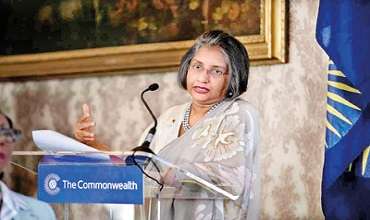CEB takes a bold step in adopting Digital Signatures
The Ceylon Electricity Board (CEB) has embarked on using the Digital Signature facility on pilot basis for a one of its divisions to improve efficiency and productivity.
Distribution operation of CEB comes under four Distribution Divisions. CEB partnered with LankaSign Certificate Authority (CA) to introduce the Digital Signature facility to Distribution Division 4 for the pilot stage, which consists of Southern Province I and II; and Western Province - South I. Within Division 4 there are over 60 Distribution Branches, Distribution Provincial Offices, Area Offices and Consumer Service Centres. Prior to introducing digital signatures, document signing was done manually, which needed documents to be either faxed and hand delivered. With the introduction of LankaSign digital signatures, all approvals within Distribution Division 4 can now be done via email much conveniently, efficiently and most importantly, securely, according to a media release issued by LankaSign.
In the next phase, CEB would be expanding the same facility to their other staff members and dDivisions to ensure that they provide an even better service to the nation.
With the prolonged pandemic situation, organisations across the world have been left with little choice but to operate remotely. Among the many challenges faced by the organizations in the current pandemic-affected environment is the difficulty in getting physical documents signed by signatories and deliver them to the intended receiver.
The CEB approached LankaSign CA to obtain Digital Certificates for the above purpose and has worked with the CA team to ensure a flawless implementation of the pilot project. LankaSign, operated by LankaClear - the operator of LankaPay national payment network, functions under the supervision of the Central Bank and is the only Certification Service Provider (CSP) currently operating in Sri Lanka authorized by the National Certification Authority (NCA). The Electronic Transactions Act no. 19 of 2006 (ETA) grants authority for a nationally recognized body to perform the function of the NCA. The NCA is the overall governance and the standard setting entity required for the smooth and effective functioning of CSPs in Sri Lanka. The issue of digital certificates is to be performed by authorized third-party CSPs, as per the provisions of the ETA and the subsequent amendments made via the Act No. 25 of 2017.
LankaSign CA caters to the critical need of originator authentication and has three key features, namely authentication - authenticates the source of messages since the ownership of a digital certificate is bound to a specific user; integrity – indicates if the document has been modified after being digitally signed and in addition the document can also be locked so that no modification is permitted after signing.; and non-repudiation – a sender cannot deny the fact that he/she sent the message, which has his/her digital signature.
Speaking about this groundbreaking initiatiative, Rohan Seneviratne, Additional General Manager -Distribution Division IV said, “the CEB takes great pride in taking this giant leap towards digitalization and to have been one of the first few government agencies to implement Digital Signatures. At the pilot stage, digital signing has been introduced in relation to the distribution operation of Division IV of CEB. With over 60 sub offices scattered across three provinces, we found manual handling of documents to be a cumbersome affair leading to delays and unnecessary administrative expenses. With this manual practice, we found it extremely challenging to continue our operations during the pandemic situation with most staff having to work remotely. We believe with the implementation of LankaSign digital signatures, we will achieve greater efficiency levels with enhanced information security and tangible cost savings for the organisation.”
A LankaSign Digital Certificate is a secure electronic file that certifies the identity of an individual seeking originate digital information via a digital communication channel. It consists of a public key and some personal details of the owner (name, email address or other information related to the owner) and is signed with the private key of the certificate holder. Launched under the guidance of the Central Bank in 2009,
-
Still No Comments Posted.















Leave Comments